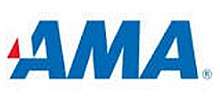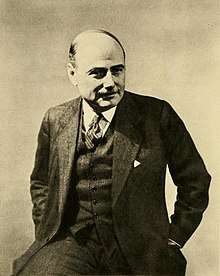American Management Association
The American Management Association (AMA) is an American non-profit educational membership organization for the promotion of management, based in New York City.[2][3][4] Besides its headquarters there, it has local head offices throughout the world.
 American Management Association (ASA) logo | |
| Predecessor | The National Association of Corporation Schools et al. |
|---|---|
| Formation | 1923 |
| Type | not-for-profit membership organization |
| Headquarters | New York City, U.S. |
Region served | Worldwide |
Membership | 25,000 members and 3,000 organizations in 90 countries |
Official language | English |
President. | Manny Avramidis.[1] |
| Website | www |
It offers its members a wide range of training programs, seminars, conferences, studies, and publications, which cover topics as diverse as industrial or commercial management, communication, finance and accounting, human resources management, leadership, international management, marketing and sales.
As a corporate training and consulting group, it provides a variety of educational and management development services to businesses, government agencies, and individuals.
History
Origins
The origins of the American Management Association dates back to the beginning of the 20th century, when the training of industrial workers became a concern for large American companies. In 1913, 35 of the most important professional schools, led by the New York Edison Company, joined forces to create The National Association of Corporation Schools (NACS).
.jpg)
It came to life at a convention held at the New York University on January 24, 1913, at which a constitution was adopted, officers were elected and provision were made for the appointment of working committees.
As first president was elected Arthur Williams, an electrical engineer and executive at the New York Edison Company,[5] as first vice-president E. St. Elmo Lewis, as second vice-president Charles Proteus Steinmetz, as secretary Lee Galloway, and as treasurer E. J. Mehren. Frederick C. Henderschott was elected assistant secretary-treasurer.[6]
The first national convention of the association was held in September that year in Dayton, Ohio, under the auspices of the National Cash Register Company. In the first year already 30+ major corporations had joined, with in total over 500.000 employees.[7]
Under the influence of Taylor's methods, the aim of the association was to promote vocational training as a factor in the competitiveness of industrial activity. After the First World War, The National Association of Corporation Schools moved closer to another recently created association, the Employment Managers' Association.
The Employment Managers' Association was in 1920 reorganized into the Industrial Relations Association of America,[8] which in 1922 merged with The National Association of Corporation Schools to form the National Personnel Association.[9]
Early years
In 1923 the association changed its name into the current American Management Association. Some of the founders of the American Management Association were Meyer Bloomfield,[10] Henry S. Dennison,[11] William J. Graham[12] and the first president Sam A. Lewisohn (1884-1951).[13]

At the end of the war, there were movements in industry to spread socialist ideals and to revive trade unionism. The American Management Association made it their mission to help managers manage social relations in order to cope with them. However, with the Great Depression of 1929, the American Management Association adopted more progressive positions to limit direct policy interventions in the management of enterprises.
With World War II the American Management Association began to advocate greater equality of treatment at work. In 1942, it published a study that called for better integration of black workers into the world of work. In 1943 it published a similar study on women's work. During these war years the American Management Association brought together a large number of business leaders, and was very close to the political power. The American Management Association Vice-President Lawrence A. Appley was one of the directors of the War Manpower Commission.
After the war the influence of American Management Association remained high, and they successively published recommendations on the quality of financial reporting in 1946, and on cooperation with the trade unions in 1948. By the time Lawrence A. Appley started his presidency, in 1948, the American Management Association offered a forum for debates, a network of influence, and a platform for the leaders in the training of business leaders.
Further developments
Throughout the 1950s, the American Management Association continued to link the world of big business with government. It was in 1961 that it began its international expansion with the opening of a European center in Brussels. It then opened one in Mexico City in 1966, Canada in 1974, Japan in 1993, Shanghai in 1995 and Latin America in 1996. During this period, several centers were also established in the United States in Atlanta, Chicago, San Francisco and Washington, DC.
In 1963, the American Management Association established the Operation Enterprise, a program designed for high school and college students.[14] From the 1960s on, it also increased its editorial activity and created a publishing house, Amacom, in 1963. In 1972, it founded a newspaper, Organizational Dynamics, and launched a second in 2000, MWorld. The American Management Association sold Amacom to HarperCollins in 2018.[15]
To date, the American Management Association has 25,000 members and 3,000 organizations in 90 countries. The current President and CEO of the American Management Association is Manny Avramidis.[1] [16]
Past presidents
Presidents of the American Management Association, and some notable other functions, have been:
- 1923-26: Sam A. Lewisohn, first president.[13][17]
- 1927 : Frank L. Sweetser[18]
- 1928 : William W. Kincaid[19]
- 1929 : Cyrus S. Ching[20][21]
- 1930-33 : William Joseph Graham[22][23][24][25]
- 1934-36: Malcolm C. Rorty[26][27]
- 1936-48: Alvin E. Dodd;[28][29] James O. McKinsey, chairman, 1936-37.[30]
- 1948-68 : Lawrence A. Appley.[31][9]
- 1968 : Alexander Trowbridge [32]
- 1968-70 : James Keith Louden
- 1971-81 : James L. Hayes.[33][34]
- 1982-90 : Thomas R. Horton[35][36]
- 1991-97: David Fagiano.[37]
- 1998-00: George B. Weathersby
- 2000-01: Barry Lawson Williams (interim) and CEO[38]
- 2001-17 : Edward T. Reilly.[39][40]
In 2017 Manny Avramidis was named 18th President and Chief Executive of the American Management Association.[40]
See also
References
- http://www.amacombooks.org
- The College Blue Book Volume 8. 1969. p. 383
- Association for Educational and Training Technology, International Yearbook of Educational and Instructional Technology, 1982. p. 291
- Ken Cooper. Effective Competency Modeling & Reporting. 2000. p. 315
- David F Noble. AMERICA BY DESIGN, 2013. p. 179
- The National Association of Corporation Schools. Bulletin, v.1, no.1-6 (inc.) (1914).
- F.C. Henderschott, "The National Association of Corporation Schools." Transactions of the American Institute of Electrical Engineers 32.2 (1913): 1413-1416.
- Bruce E. Kaufman. The Origins & Evolution of the Field of Industrial Relations in the United States. 1993. p. 11.
- Tina Grant, International Directory of Company Histories, Volume 76. 2006. p. 24
- Mark L. Savickas, "Meyer Bloomfield: Organizer of the Vocational Guidance Movement (1907–1917)" Career Development Quarterly. 57: (2009) 259-273.
- Patrick D. Reagan. Designing a New America: The Origins of New Deal Planning, 1890-1943. 1999, p. 4
- Casualty Actuarial Society, "Obituary: William Joseph Graham: 1877-1963," in: Proceedings of the Casualty Actuarial Society, Volume 50. 1964. p. 158
- Sam A. Lewisohn, 1884-1951, Stamford, Conn. : The Overbrook Press. 1951. p. 11
- Operation Enterprise: Preparing Young Adults For Successful Careers at amanet.org, 2017.
- "HC Buys AMACOM Books". PublishersWeekly.com. Retrieved 2019-04-14.
- "American Management Association." International Directory of Company Histories. Ed. Tina Grant. Vol. 76. Detroit: St. James Press, 2006. Business Insights: Essentials. Web. 31 Jan. 2014.
- William Lazonick. American Corporate Economy: Critical Perspectives on Business and Management, Volume 2. Taylor & Francis, 2002. p. 316
- Factory: The Magazine of Management, Volume 38. 1927. p. 40:
- American Management Association, Special Papers, Nr. 17, 1928. p. 21.
- American Management Association. Institute of Management Series, Nr. 2-19, 1928. p. 12
- Printers' Ink, Volume 147. 1929. p. 35
- Journal of American Insurance. 1930. p. 13.
- American Management Association, Management Review, Volume 20.1931. p. 226
- American Management Association, Management Review, Volume 22. 1933. p. 34; p. 130
- Insurance Newsweek, Volume 64, Nr 1-17. Vantage Enterprise, 1963. 0p. 13
- Arthur G. Bedeian, A Standardization of Selected Management Concepts, 1986. p. 262
- Peter A. Swenson. Capitalists Against Markets: The Making of Labor Markets and Welfare ... 2002. p. 218
- Plant Operating Management, Volume 19. 1936. p. 69, mentioned: "Alvin E. Dodd, the new president of the American Management Association,..."
- "Alvin Dodd Dead: Industry Expert," in New York Times, June 3, 1951
- Flesher, Dale L. and Tonya K. Flesher. "McKinsey, James O. (1889-1937) Archived 2012-12-14 at Archive.today." In History of Accounting: An International Encyclopedia, edited by Michael Chatfield and Richard Vangermeersch. New York: Garland Publishing, 1996. pp. 410–411.
- Michigan Business Review, Volumes 17-19. 1965. p. 35
- Robert Sobel (ed.). Biographical Directory of the United States Executive Branch, 1774-1989. 1990. p. 357
- Association Management, Volume 23. 1971. p. 11
- "J. L. Hayes, 74; Led Business Association," New York Times, May 17, 1989.
- The American Economy in Transition, 1983. p. 12:
- "Paid Notice: Deaths HORTON, THOMAS R." New York Times, August 12. 2003.
- Management Review: Managing For Quality, 1994. p 8
- Barry Williams, The HistoryMakers, 2017. Accessed 2017-10-06.
- Allyson Stewart-Allen, Lanie Denslow. Working with Americans: How to Build Profitable Business Relationships. 2002. Back cover.
- AMA. "American Management Association International Names New CEO; Reilly to Pass the Reins After 16 Years of Leadership," at amanet.org, 6/16/2017.
Further reading
- F.C. Henderschott, "The National Association of Corporation Schools." Transactions of the American Institute of Electrical Engineers 32.2 (1913): 1413-1416.
- Jacoby, Sanford M. Employing bureaucracy: Managers, unions, and the transformation of work in American industry, 1900-1945. Columbia University Press, 1985.
- Lange, William H. The American Management Association and Its Predecessors: Significant Evidence of Trends in Personnel Management and Industrial Relations. Special paper no. 17. New York: American Management Association, 1928.